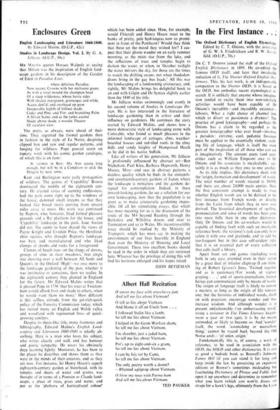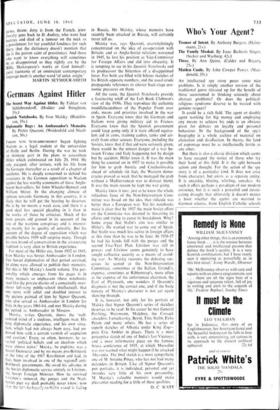In the First Instance .
The Oxford Dictionary of English Etymology, Edited by C. T. Onions, with the assistance of G. W. S. Friedrichsen and R. W. Burch- field. (O.U.P., 70s.) DR C. T. ONIONS joined the staff of the Oxford English Dictionary in 1895. He co-edited the famous OED itself, and later that •invaluable redaction of it, The Shorter Oxford English Dic. tionary. This, his last work, is an indispensable companion to the Shorter OED; it is based on the OED, but embodies recent etymological re- search. It is unlikely that anyone whose imagina- tion tended to excite them into non-scholarly activities would have been capable of Dr Onions's incredible—and incredibly extended— labours. What a right choice of channel into which to divert so passionate a dryness! The practice of good lexicography—and perhaps Dr Onions has a claim to be regarded as the greatest lexicographer who ever lived—involves a paradox: extreme, cool, pedantic fussiness must be applied to the essentially violent, seeth- ing life of language, which is itself the main part of the inspiration of all those who can use it imaginatively. The amount poets (and poet- critics such as William Empson) owe to Dr Onions and his associates is incalculable: cer- tainly it is as much as they owe to one another.
As its title implies, this dictionary deals with the 'origin, formation and development' of words. The total number of words treated is 38,000, and there are about 24,000 main entries. Here the first consistent attempt is made to trace whether English words are to be derived in the first instance from French words or directly from the Latin from which they in. turn were derived. The historical development of spelling, pronunciation and sense of words has been gone into more fully than in any other dictionary. Only Dr Onions and his co-workers would be capable of finding fault with such an invaluable reference book: the reviewer's task can only be to salute it with awe and gratitude, and to add the too-frequent but in this case self-evident rider that it is an essential part of every collection that calls itself a library.
Apart from sex and games (including war), both in any case attended even in their action by a great deal of inferior claptrap (I am think- ing of Robert Qraves's lines, 'Twined together and as is customary/For words of rapture groping . . .,' and of sports-journalism), human beings can communicate only by means of words. The origin of language itself is likely to remain a mystery as long as the origin of life remains one; but the histories of individual words, dwelt on with precision, encourage wonder and thus increase wisdom. And although wonder is at present unfashionable ('an embarrassing word,' wrote a reviewer in The Times Literary Supple- ment a year or two ago), it is by no means outmoded, or likbly to become so. And; wonder' itself, the word, 'astonishing or marvellous thing,' cannot be traced back beyond the Old. Noise undr.: 'of unkn. origin.'
Fundamentally this is, of course, a work of reference, to be used in association with the OED, the SOED and other dictionaries. It is also as good a bedside book as Boswell's Johnson, Fanny. Hill (if you can stand it for long and keep inside the law by possesiing an expensive edition) or Brewer's sometimes . misleading but fascinating Dictionary of Phrase and Fable. Just open it up anywhere and determine to remember what you learn (which you won't). Asses are straps for a hawk's legs, ultimately from the. Latin jactus, throw. Jetty is from the French, jeter. Tawdry goes back to St Audrey, who wore lace neckties and died of a tumour on the neck as a punishment for her youthful fondness for such finery (but the dictionary doesn't mention that she is the patron saint of prostitutes). And those who want to know everything will sometimes he as disappointed as they rightly are by the Bible, Shakespeare's works or God himself : quirk (surname of an omniscient contemporary language man) is another word 'of unkn. origin.'
MARTIN SEYMOUR-SMITH



































 Previous page
Previous page